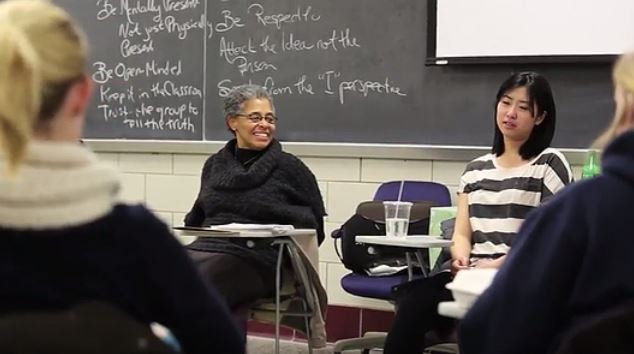Villanova University Receives $5 Million Gift to Create Intergroup Dialogue Center
A $5 million gift from the Lorenzini Family Foundation will support diversity, equity and inclusion initiatives at the University.
The new center will strengthen Villanova’s existing Intergroup Relations program and focus on curricular transformation and faculty training.

The new Intergroup Dialogue Center will amplify Villanova’s existing IGR program, which teaches students to create meaningful dialogue and relationships among people from different social, economic, racial and ethnic groups.
VILLANOVA, Pa. – Villanova University has announced a $5 million gift from the Lorenzini Family Foundation to support the creation of a new Intergroup Dialogue Center, dedicated to building communication and understanding to bridge difference and preparing students to thrive in a diverse world. Housed within Villanova’s Office of Diversity, Equity and Inclusion (ODEI), and based upon the University’s successful Intergroup Relations (IGR) program, the Center will focus on curricular transformation and faculty training. The Intergroup Dialogue Center will also amplify Villanova’s existing IGR program, which teaches students to create meaningful dialogue and relationships among people from different social, economic, racial and ethnic groups.
"We believe that the willingness and ability to participate in thoughtful, open discussions with a goal of understanding, rather than conquering, is fundamentally critical to forming healthy human relationships,” said the Lorenzini family. “We’re excited to partner with Villanova and ODEI to champion those values through the expansion of IGR to every student at Villanova. This is all possible because of the exceptional work that Dr. Teresa Nance (Villanova’s Vice President for Diversity, Equity and Inclusion and Chief Diversity Officer) and her team have done with IGR, and we look forward to the formation of the Intergroup Dialogue Center. Our wish is that the whole Nova Nation is armed with this critical skill set as they move through the world, so they can be the champions of real, lasting change."
“With this extraordinary gift, the Lorenzinis have shown great generosity and vision,” said the Rev. Peter M. Donohue, OSA, PhD, Villanova University President. “At Villanova, we are always striving to answer St. Augustine’s call to create an authentic community, but building community takes work. It necessitates a deeper understanding of ourselves and one another—our similarities, but, even more importantly, our differences. With the Lorenzinis’ gift, the Intergroup Dialogue Center at Villanova is a first step in that process toward building a more complete, inclusive community on our campus and beyond.”
Villanova launched its IGR program in 2010, based upon an initiative developed at the University of Michigan. Since then, it has become a national leader in advancing this innovative approach to examining and discussing important issues of social justice. The program includes a series of one-credit classes—taught by highly trained facilitators—where Villanova students learn communication skills related to careful listening and productive dialogue and then put those skills to work in navigating difficult interactions with classmates. IGR course topics include race, gender, religion/faith, socioeconomic status, sexual orientation and ability. To make teaching and learning more inclusive, the IGR program has also hosted workshops and collaborated with faculty from across the University. In classrooms throughout campus, faculty are now using IGR’s inclusive, dialogue-driven techniques and approaches.
The Intergroup Dialogue Center will add to Villanova’s recently fortified diversity, equity and inclusion resources. This summer, to give ODEI more prominence within the University community and to position it for maximum impact, Father Donohue named Dr. Nance as Vice President for Diversity, Equity and Inclusion—reporting directly to the President. At that same time, Father Donohue also announced a new task force, Aequitas: The Presidential Task Force on Race, that he charged with working with relevant constituencies to develop a University diversity course experience that includes a dialogue component and to adjust Villanova’s Learning Goals to include a goal on anti-racism education and cultural competence.
The Lorenzini Family Foundation’s gift will enable the Intergroup Dialogue Center to move ahead immediately with the University’s plans to develop and implement a new diversity curriculum that will feature IGR. To do this, it will work closely with academic leadership and faculty members from across the University’s schools and colleges. Beyond its role in helping transform teaching and learning at Villanova, the center will also serve as a general resource for faculty and staff in applying IGR’s techniques and approaches in their classrooms and offices. Ultimately, the Intergroup Dialogue Center will facilitate the delivery of IGR-rich courses to all Villanova students.
“The Lorenzinis’ gift is turning our highest aspirations for IGR into reality at Villanova,” said Dr. Nance. “We are fortunate to have partners who believe so deeply in the work we are doing and who see the urgency as well as the incredible potential of this moment. We are grateful for their vision, their passion and their faith in Villanova to seed real change.”
“This incredible gift from the Lorenzini Family Foundation provides crucial support to an area of utmost importance to the University. Villanovans have spoken up about how our university can and must do more to support our community members of color. Villanovans today and in the future will be positively impacted by the Lorenzinis’ generosity,” said Michael O’Neill, Senior Vice President for University Advancement.
About Villanova University: Since 1842, Villanova University’s Augustinian Catholic intellectual tradition has been the cornerstone of an academic community in which students learn to think critically, act compassionately and succeed while serving others. There are more than 10,000 undergraduate, graduate and law students in the University's six colleges—the College of Liberal Arts and Sciences, the Villanova School of Business, the College of Engineering, the M. Louise Fitzpatrick College of Nursing, the College of Professional Studies and the Villanova University Charles Widger School of Law. Ranked among the nation’s top universities, Villanova supports its students’ intellectual growth and prepares them to become ethical leaders who create positive change everywhere life takes them. For more, visit
